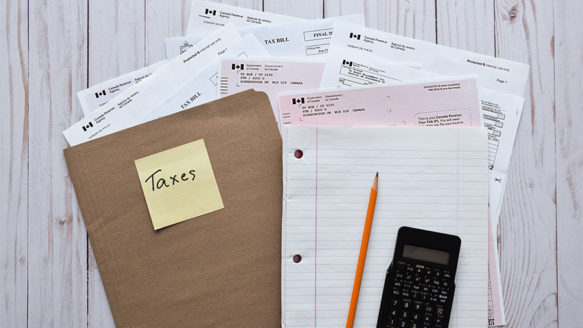
The Importance of Financial Check-Ups
When you think about your health, what comes to mind? Most people will automatically jump to physical, mental and emotional health―but what about financial? Health is multi-faceted, and all sides are linked to each other. When one side is slipping, it tends to affect the others as well.
If you feel like your financial health is slipping, you’re not alone. According to a study done by Capital One and Credit Canada, 30% of Canadians said their financial stress was a bigger concern to them than their overall health.
Just like you do with your yearly physicals, it’s important to schedule in financial check-ups. Setting some time aside once a year (at least!) to assess your finances and re-calibrate certain areas of your money will not only benefit your financial well-being, but your overall well-being as well. Take this as an opportunity to review how you’ve done financially this past year and ensure you’re still on the right path to achieving your financial goals.
So how do you conduct a financial check-up? Easy!
Step 1) Identify your goals for the next 12 months
Just like anything in life, goals can change over time. You accomplish some, put others to the side and make new ones. Take this first step to evaluate the goals you had in the past and rework them to reflect your new goals for the future.
Step 2) Consider any changes
Did you have any changes take place this past year or do you expect any big changes to take place this year? These changes can be unfortunate (like unemployment, divorce, illness, etc.) or happy ones (like a new job, promotion, new baby, sending your child to college, retirement, etc.). Whatever changes you had or will be having in your personal life, make sure to consider them before looking at your budget.
Step 3) Evaluate your budget
If you haven’t made a budget yet, now’s the time. A good budget is truly the foundation for a solid financial well-being. If you already have a budget, this step will be a little bit easier. While you should ideally be reviewing your budget every month or so, we understand life can get busy and things fall to the wayside. This financial check-up is a good time to review your current budget and make any revisions to it to reflect this upcoming year’s changes and goals.
Step 4) Evaluate your debts
How have you been at chipping away at your debt? If you haven’t been doing as well as you’d like, now’s the time to identify where those gaps are and find a way to fix them. And remember, if you need help to tackle your debt, contact us! One of our experienced, unbiased counsellors can assess your financial situation and walk you through your debt repayment options―including the federally-legislated Orderly Payment of Debts (OPD) program.
Step 5) Look over your emergency funds
If you had to pay for an emergency today, could you do it? Don’t underestimate the importance of a good emergency fund! While the dream is to always have six months of savings in there, that’s not always obtainable. Start by having at least 90 days of savings to cover any emergency that pops up.
Step 6) Review your retirement
It doesn’t matter what age you are―planning for retirement is crucial. Ensure at this time that your retirement savings are in line with your retirement goals. Are you contributing as much as you possibly can? If not, find out where you can contribute more and then make a plan to do this going forward.
After completing your financial check-in, you may realize that you aren’t on top of everything like you’d originally thought. That’s okay! Luckily, there are so many great resources to help you gain a better insight on your financials―and many of them are on this website!
- Complete as many FREE online courses as you like. We have a variety of financial courses to go through all ranging in topics from “Budget Boot Camp,” “How to Financially Survive a Layoff,” “Tackle Debt” and “Financial Planning Closer to Retirement.”
- Fill in one of our FREE youth and adult spending plan forms to help you stay on track
- Read through our FREE Credit Comeback handbook
- See how your money adds up with our FREE financial calculators
- Create a budget with the help of our FREE Stretch Your Dollars workbook
And lastly, remember―it’s okay to ask for help! Whether you’d like to look at your debt repayment options or simply want to talk to someone about your budget and financial goals, our counsellors are here for you. Contact us to make an appointment. Together, we can get your financial health back on track!






